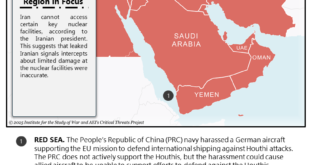Recent U.S. retaliatory strikes on Iran-aligned militia forces in Iraq have fueled pro-Iranian political and militia leaders to accelerate their efforts to force a U.S. withdrawal.
The government of Prime Minister Mohammed Shia al-Sudani is working to reflect public opposition to U.S. strikes on Iraqi territory while remaining engaged with both the United States and Iran.
U.S. leaders view a continued U.S. military mission in Iraq as crucial to preventing a resurgence of the Islamic State and containing Iran’s regional influence.
An end to the war in Gaza would not cause Iran-aligned groups to stop attacking U.S. forces or resolve the U.S.-Iranian struggle to wield preponderant influence in Iraq.
U.S. retaliatory strikes on Iran-aligned Iraqi militia targets over the past two weeks have widened divisions within the Iraqi government and between U.S. and Iraqi officials over the future of U.S.-Iraq relations. On February 2, U.S. forces struck more than 85 targets in Iraq and Syria in retaliation for an Iran-aligned militia drone attack that killed three U.S. military personnel on a remote base (“Tower 22”) on the Jordanian side of the border with Iraq and Syria. On February 7, U.S. forces conducted a targeted strike in downtown Baghdad, killing a key logistics commander of the Kata’ib Hezbollah (KH) militia that U.S. officials say was responsible for the Jordan base attack. Pro-Iranian Iraqi militia commanders, some of whom are politically influential, have cited the two U.S. strikes, in particular, as cause to demand that the government of Prime Minister Mohammed Shia al-Sudani immediately terminate the U.S. military mission in Iraq. Hadi al-Ameri, who heads the Badr Organization, a Shia-dominated political-military group organized by Iran’s Islamic Revolutionary Guard Corps (IRGC) during the 1980-88 Iran-Iraq war, reflected the sentiment of pro-Iranian groups by saying: “We do not believe in negotiations…and American forces must be removed immediately from Iraq.” KH issued a recent statement calling for the liberation of Iraq from the United States, not just the land and the skies, but also from Iraqi politics. Iraq’s Harakat al-Nujaba movement – one of the most active groups attacking U.S. forces in Iraq and Syria – promised a “targeted retaliation,” saying “these crimes will not go unpunished.” Prime Minister al-Sudani, seeking to retain the support of his core pro-Iranian base and reflect public opposition to the U.S. strikes, also lashed out at the United States. He stated: “Our land and sovereign authority is not the right place for rival forces to send messages and show their strength.” U.S. leaders have explained the strikes as necessary for self-defense – justified responses to attacks on U.S. forces by Iran-backed groups.
The recent U.S. retaliatory attacks have fueled, but did not start, an effort by Tehran and its Iraqi allies to force a U.S. withdrawal from the country. Iran’s allies have long sought to extend Tehran’s influence and limit that of the United States. Iran-backed actors in Iraq, including in formal votes in the Iraqi National Assembly, have been trying to formally demand an exit of U.S. forces from the country since the January 2020 Trump administration strike on the revered IRGC-Qods Force commander Qasem Soleimani. That attack also killed KH founder Abu Mahdi al-Muhandis, who was traveling with Soleimani outside Baghdad International Airport, motivating the group to seek revenge. Only temporarily deterred, pro-Iranian groups in Iraq, which operate across the border in Syria as well, conducted more than 80 attacks on U.S. forces in Iraq and Syria from early 2021 until the October 7 Hamas attack on Israel.
As the cycle of attack and retaliation intensified in concert with Israel’s ongoing offensive in Gaza, signs appeared that pro-Iranian factions might achieve their objectives. In January, Iraqi and U.S. military officials announced they would hold formal talks through the bilateral U.S.-Iraq Higher Military Commission (HMC) on the mission of the U.S.-led coalition in Iraq. The announcement implied the U.S. would agree to reduce its presence in the country substantially. However, U.S. Defense Department statements referenced discussions of a transition to a new security partnership – not withdrawal. The U.S. agreement to discuss transitioning its military presence, approximately 2,500 U.S. military personnel that train and advise Iraqi government forces, appeared to reflect an effort by U.S. officials to deprive Iran-backed groups in Iraq of a rationale to continue attacking U.S. forces. However, the U.S.-Iraq HMC process reportedly was paused immediately after the January 28 attack on Tower 22 in Jordan. According to the spokesperson for the commander-in-chief of the Iraqi Armed forces, meetings resumed on February 11 to establish a timeline for the gradual reduction and eventual conclusion of the U.S.-led mission. However, in the context of a regional war waged by Iran and its allies, U.S. officials view a continuing military mission in Iraq as crucial for preventing an Islamic State (IS) resurgence – which is the officially stated mission being performed by U.S. forces in Iraq – and for rolling back, or at least containing Iran’s influence. Nor do U.S. military leaders want to be perceived as pulling back U.S. forces in the face of Iran’s challenge. For its part, Tehran will continue to press Baghdad to limit any enduring U.S. presence as much as possible. The current head of the IRGC Qods Force, Gen. Ismail Qaani, visited Baghdad in early February for meetings with Iraq’s security officials, almost certainly pressing Iraqi officials to expel U.S. troops from the country.
Reflecting his view that a U.S. military mission in Iraq is needed to preserve stability and prevent an IS resurgence, Sudani’s critical statements did not demand an immediate end to the U.S. military presence. He and other senior Shia leaders, including the popular cleric Moqtada Al Sadr, do not want to open Iraq to preponderant Iranian influence by expelling the 2,500 U.S. forces from the country. Moderate Iraqis of all the major communities, including the majority Shia population, see alignment with Iran as alienating Iraq from the Arab world, undermining Iraq’s transition to democracy, facilitating Tehran’s ability to extract economic benefits from Iraq, and enabling Iranian leaders to use Iraq as an arena to challenge U.S. influence throughout the Middle East. Many Iraqi strategists, as do their American counterparts, also see the potential for an IS resurgence as real. Mazloum Abdi, whose Kurdish-dominated Syrian Democratic Forces cooperate with U.S. forces in Syria as well as with Iraqi Kurds across the border, recently told journalists in Washington that the post-October 7 regional violence is enabling “[IS to take advantage] from all these attacks. We have also seen a spike in movements from [IS}.” A resurging IS in Syria almost certainly implies that the Sunni jihadist group is expanding its operations in Iraq as well. Because the intra-Iraq contest reflects competing visions of Iraq’s future alignments, the fissures over the U.S. military mission in Iraq will endure long after the Gaza war ends.
Even as Baghdad has criticized U.S. military operations against Iran-backed groups on Iraqi territory, the Sudani government has continued to cooperate with U.S. efforts to contain Iranian power. On February 4, the government banned eight local commercial banks from engaging in U.S. dollar transactions. The move came days after a visit by a top U.S. Treasury official who urged Iraq to make additional efforts to protect the Iraqi and financial systems from criminal, corrupt, and terrorist actors. The U.S. has leverage to compel Iraqi financial authorities to cooperate, in large part because more than $100 billion in Iraqi reserve funds are held in the U.S.-based Federal Reserve accounts. U.S. leaders have the ability to block Iraq from accessing its funds if Iraqi banks are determined to be helping Iran and Iran-backed actors acquire U.S. dollars. During the Treasury official’s visit, the department announced action against Al-Huda Bank, saying it was involved in diverting billions of U.S. dollars to Iranian-backed groups. The financial cooperation seemingly reflects Baghdad’s core principle that, despite public and pro-Iranian group sentiment in the context of heightened turmoil inside Iraq, the country’s long-term future probably lies with the United States, the broader West, and those Arab states that are close security partners of the United States.
 Eurasia Press & News
Eurasia Press & News



